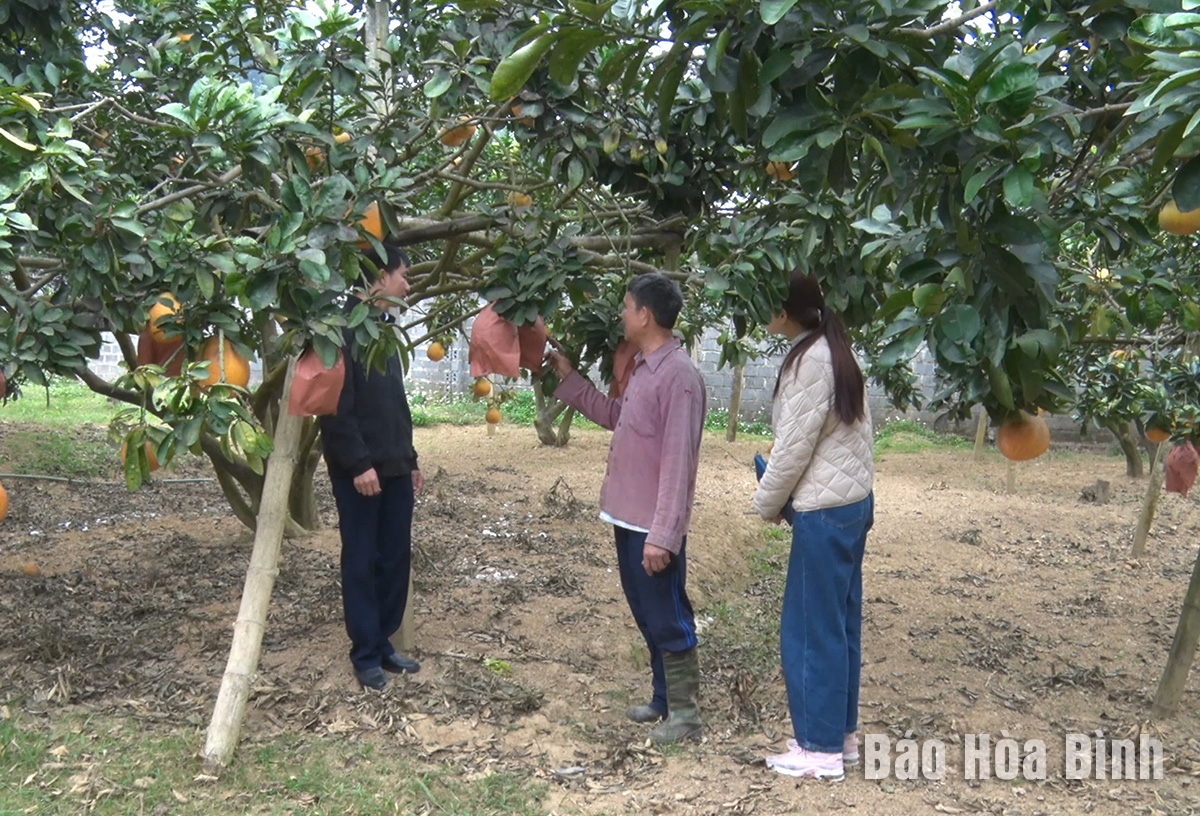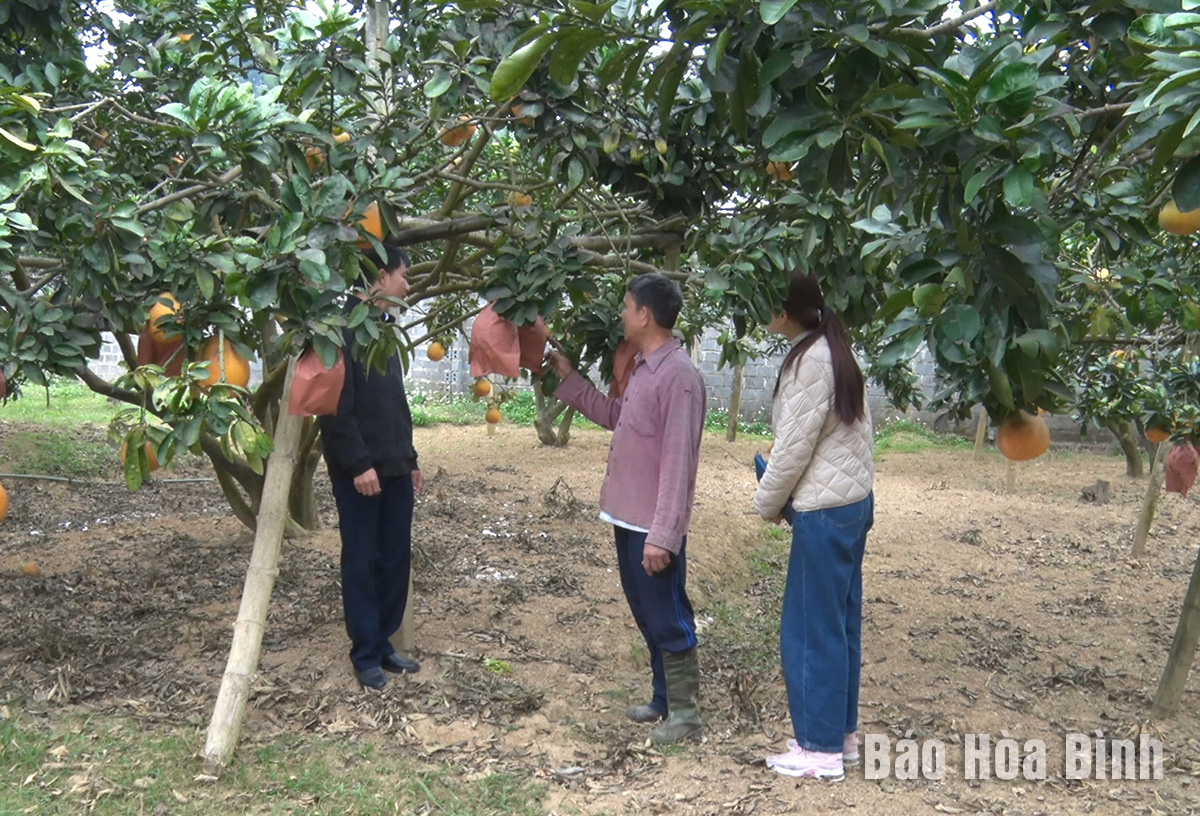
Pomelo growers in Tan Lac district, Hoa Binh province are busy preparing to harvest and supply high-quality products to the market on the occasion of the 2024 Lunar New Year (Tet) festival.

A pomelo farm at Tan Huong hamlet, Thanh Hoi commune, Tan
Lac district.
In Tan Lac district, there are 1,108 ha of pomelo, including 885 ha of
red-flesh pomelo, 67 ha of green-skinned pomelo, and 134 ha of Dien pomelo. The
district has 11 cooperatives and five cooperative groups operating in the field
of pomelo farming and trading.
Six local cooperatives have received planting area codes for
export to the EU market, with a total area of 153 ha while two facilities were
granted codes to export to the New Zealand market, with an area of 46.8 ha. The district sees an annual pomelo output of over 17,000 tonnes.
Each ha of pomelo generates about 190 million VND (7,760 USD) on average.
Currently, some pomelo growing areas in communes like Thanh Hoi,
Dong Lai, and Tu Ne can generate about 380 - 415 million VND per ha per year. This year, people in Thanh Hoi commune in particular and people
of Tan Lac district in general are happy to see 13.5 tonnes or 13,400 pomelos
exported to the UK market, a sharp increase from 5,400 fruits in 2022 and 8,000
fruits in 2023.
Bui Van Thao, Vice Chairman of the Thanh Hoi commune People's
Committee said that the pomelo growing area has been expanded in the locality.
Now, local farmers are paying much attention to nursing trees
and preserving fruits so that they can supply to market high-quality products
during the Tet celebration.
Duong Tat Tinh, one of the first and best pomelo growers in Thanh Hoi commune
said that he grows more than 200 trees in his 4,600-sq.m farm." This year, the weather is favourable so the fruit yield is
higher than previous year,” he said, adding that now, the price is lower. Wholesalers from neighbouring districts pay about 8,000 - 10,000
VND for a pomelo at the gardens.
Meanwhile, red-flesh pomelo farming has helped members of Binh Minh Services
and Rural Development Cooperative escape poverty and get a stable source of
income.
Nguyen Thi Oanh, director of the cooperative predicted that the
pomelo price during the Lunar New Year this year will not increase much.
However, pomelo growers are still happy as almost all their products have been
ordered already.
Besides Thanh Hoi commune, many localities in the Tan Lac
district are eyeing to expand pomelo growing areas. However, the district
authorities want to keep the growing areas unchanged and apply technical
advances to replace degraded pomelo areas with low-quality.
According to data from the Hoa Binh Provincial Party Committee, the industrial production index for the first six months of 2025 is estimated to have increased by 20% compared to the same period last year. This marks the highest year-on-year growth rate for this period since 2020.
In the first six months of 2025, Hoa Binh province’s export turnover was estimated at 1.145 billion USD, marking an 18.11% increase compared to the same period in 2024. Import turnover was estimated at $ 804 million, a 17.15% increase, which helped the province maintain a positive trade balance.
The lives of the ethnic minority farmers in Tan Lac district have gradually improved thanks to the new directions in agricultural production. This is a testament to the collective strength fostered through the professional associations and groups implemented by various levels of the district’s Farmers’ Union.
With the motto the "product quality comes first,” after nearly one year of establishment and operation, Muong village’s Clean Food Agricultural and Commercial Cooperative, located in Cau Hamlet, Hung Son Commune (Kim Boi district), has launched reputable, high-quality agricultural products to the market that are well-received by consumers. The products such as Muong village’s pork sausage, salt-cured chicken, and salt-cured pork hocks have gradually carved out a place in the market and they are on the path to obtaining the OCOP certification.
In the past, the phrase "bumper harvest, rock-bottom prices" was a familiar refrain for Vietnamese farmers engaged in fragmented, small-scale agriculture. But today, a new spirit is emerging across rural areas of Hoa Binh province - one of collaboration, organisation, and collective economic models that provide a stable foundation for production.
Maintaining growing area codes and packing facility codes in accordance with regulations is a mandatory requirement for agricultural products to be eligible for export. Recently, the Department of Agriculture and Environment of Hoa Binh province has intensified technical supervision of designated farming areas and packing facilities to safeguard the "green passport" that enables its products to access international markets.



